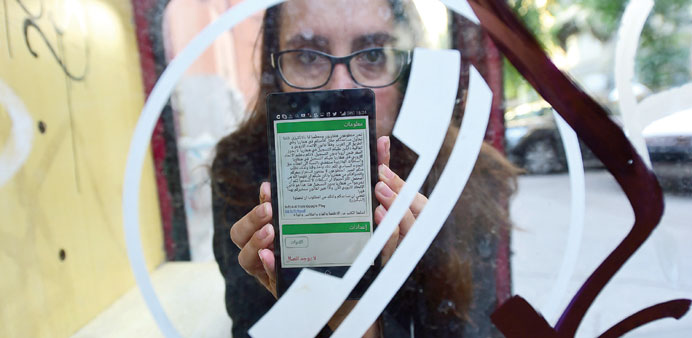AFP
Budapest
As migrants are shunted by countries between borders on trains and buses, a team of Hungarian activists are racing to send them accurate information, straight to their pockets on mobile phones.
“Bewildered people don’t know what is happening to them, they are starved of information – sometimes deliberately, if it suits the authorities,” says Nina Kov, one half of a husband-and-wife team who dreamed up InfoAid, a free smartphone app available in six languages.
“We are sending anyone who downloads it the latest news on border closures, who is bussing from where to where, the latest asylum procedures, news on Hungary’s new laws and so on,” she told AFP during an interview in Budapest.
Enlisting the help of two friends to code the app, InfoAid was ready to go in two days around two weeks ago, the urgency triggered by what Kov calls “misinformation by the Hungarian authorities”.
Earlier this month, when migrants crowded onto a train in Budapest, many said later they thought it was going to Austria – only for it to halt at a refugee camp not far from the capital.
“It is one thing that they were not getting proper information in Hungary, but to be apparently misled was really outrageous,” Kov says.
Since then, as events have moved rapidly on the ground from borders between Hungary, Serbia, Croatia, Slovenia, and back to Hungary, the team have been scrambling to keep up, now working closely with Croatian activists.
Once users download the Android-based software to their smartphones, they can select one of six languages: Arabic, Urdu, Pashto, Farsi, English and Hungarian.
“If we can find more translators we can add more languages. Greek is next in line so that activists there can let refugees heading north what to expect,” Kov said.
One of the two coders behind the app – 28-year-old Afghan-Hungarian Enys Mones, who Kov calls the “brains” of the operation – told AFP that there are already 700 daily active users, and around 100 new ones every day.
“One user can then spread the word, so more people are getting real-time info,” Kov says.
A half-Hungarian born in Paris, 34-year-old Kov says her ethnic-German grandfather was forced to leave his home in Romania in 1946, while her Russian father swapped “anti-Russian” Hungary for France in the late-1970s.
“Everyone in Europe has refugee blood, if you look deep enough inside,” she says.

Kov shows her phone with the InfoAid app on it.
